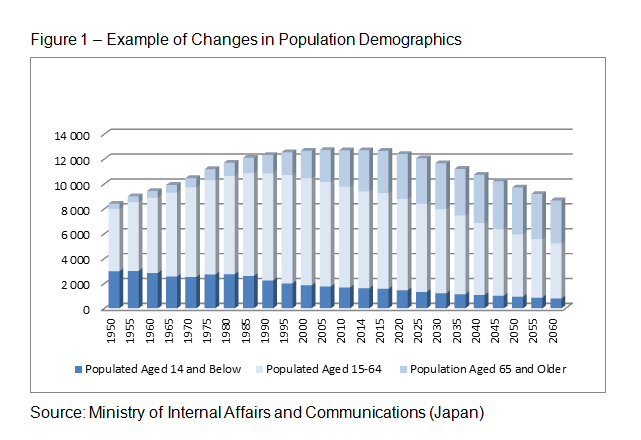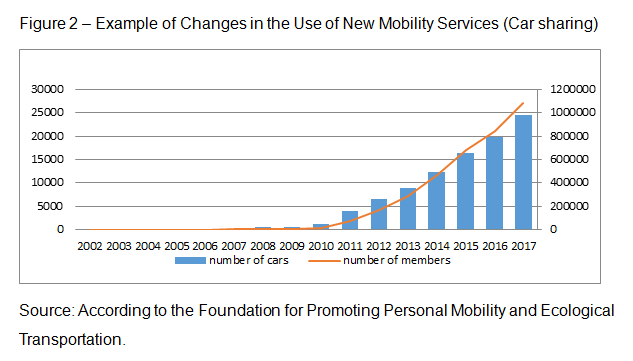Ai Nishimura
Environmental urban policy and regional planning for the transformation of mobility
(06/07/2017)

Background
The consumption of a diverse range of lifestyle services in local communities is dramatically changing due to the social, economic, and environmental background of recent years. Social change brings with it new consumer needs along with changes in population demographics. The exacerbation of global environmental issues demands realizing a low energy-consumption society. Individual activities and local social needs are also transforming in the midst of changes such as these tendencies. Dealing with global environmental issues, dealing with domestic changes in population demographics (such as an aging population with a low birthrate), efficiently managing cities through public-private sector partnerships, and developing new industries are all necessary in order for the sustainable development of cities and local communities. The state of mobility is also an important factor in local communities as well. The necessity of ensuring mobility (mobility which is suitable for the diverse needs of local communities) for supporting individual activities and movement is being discussed in some reports by international organizations, in addition to the fact that new mobility developments from technological perspectives are also needed.
Improving public transportation starting with railway networks greatly contributes to economic growth and urban development, and it also supports the activities of ordinary citizens. Improving access networks to airports and various city centers and activities in major cities is closely related with economic activity, and is deeply involved in the growth of metropolitan areas. At the same time, high-speed transportation and safe subways that strictly adhere to schedule also improve accessibility for ordinary citizens’ activities within the city. On the other hand, people mainly have usedpersonal cars in rural areas, new means of movement are now being sought due to changes such as domestic social changes like population demographics and the progress of global environmental issues. In order to deal with such social, economic, and environmental aspects, all countries are making an effort to amend legal systems according to circumstances in the priority domestic matter of each country, along with expanding various efforts in local communities which include sustainable mobility under a diverse range of actors.
Mobility in local communities requires that users be able to make appropriate choices according to the distance they are moving and the cultural, geographical, and social conditions of the local area. It will also differ depending on user attributes (the elderly, children, student, etc.). Therefore, it is possible for new mobility services to become further sustainable by effectively adapting to the needs of these societies and local communities. With the exacerbation of global environmental issues and so on in the background, the technological innovations for diverse services (which include mobility) are being made by the various partnerships, which are making demonstrable efforts in several local communities. Although those efforts will be moved to the application phase in actual societies in the near future, it is thought necessary to continue matching these new services and the needs of the local society in order to promote the use of efficient and convenient mobility.
Research Scope
Based on the background of the above-mentioned social, economic, and environmental aspects as well as changes in national framework policies and legal systems responding to domestic and global issues, I will research targeting public policy and local communities that are advancing specific efforts.
The theme of this study is researching from the perspective of urban regional policies in particular a methodology for how new advanced services can be introduced to local communities. The focal point at the time services are introduced is on services that are based on needs in terms of global environmental issues, as well as the local social issues that local communities are directly facing.
The research method is to comparatively study the following items in local communities where new services have been verified: 1) An overview of the local community situation, 2) the social needs of the local community, 3) the background and history of the service’s introduction, 4) changes in the local community due to introducing the service, and 5) challenges for vitalizing the use of the service. This research analyzes the usage patterns of services which comply with local characteristics, and examines how to connect those services with the regional needs from the perspective of urban regional policies meant for vitalizing use of these services.


- OECD (2013), Green Growth in Cities, OECD Green Growth Studies
- OECD (2012), Compact City Policies: A Comparative Assessment
- World Bank (2010), Eco2 cities
- Takashi Onishi, Hikaru Kobayashi et al. (2010), Low carbon cities, the future of Urban Planning
- Ministère de l’Ecologie, du Développement Durable et l’Energie, (2009) Dossier de presse 1 ère Conférence nationale Ville durable
|









